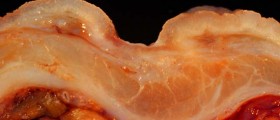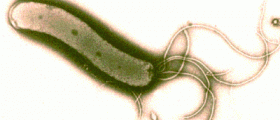
What are Esophageal Ulcers?
An esophageal ulcer is an open, painful, sore or wound located in the lower part of the esophagus — the tube that links your throat to your stomach, and which transports food and liquids from the former to the latter. Esophageal ulcers occur due to stomach acid entering esophagus, causing irritation of its mucus membrane. The bacterium Helicobacter pylori is another cause.
The inner layer of the esophagus has no protection against stomach acid, unlike the lining of the stomach itself. This is why prolonged exposure to this acid, as seen in frequent episodes of heartburn, can easily cause the formation of esophageal ulcers.
Esophageal ulcers typically occur in people suffering from gastroesphageal reflux disease (GERD). However, even though GERD is the leading cause of esophageal ulcers it is not the only medical condition which leads to esophageal ulcers. Barrett's ulcer is a chronic ulcer which occurs because certain parts of esophageal mucous membrane have changed so that typical esophageal epithelium is switched with one that is normally found in the stomach. Other causes of esophageal ulcer include the prolonged usage of non-steroidal anti-inflammatory medications and smoking.
Symptoms of Esophageal Ulcers
The presence of an esophageal ulcer most commonly features with dull or burning pain. This pain is characteristic of all peptic ulcers. The pain may be localized at the back of the breastbone or it may radiate towards the neck, throat, and upper part of the chest or in extreme cases even towards the facial area. The pain may last anywhere from a few minutes to even several hours and it is usually intermittent, meaning you will experience the pain in bouts rather than constantly.
When they are healing, ulcers tend to form scar tissue. This scar tissue may cause a narrowing of the esophagus that can lead to additional symptoms and signs such as difficulties with swallowing. In the beginning, the patient may complain about problems with swallowing of solid food and in severe cases they may even have difficulties when they attempt to swallow liquids. In rather rare cases, patients with esophageal ulcers may even experience breathing difficulties.
Additional symptoms of esophageal ulcers are a sore throat and excessive production of saliva.
Some ulcers may be so deep that they affect underlying blood vessels and cause bleeding. Bleeding is not such a common symptom of esophageal ulcers. It is more a complication of an esophageal ulcer. The blood originating from the esophagus is mixed with the stool, giving it a black coloration. In severe bleeding, a patient may even vomit blood.
Weight loss and changes in appetite can also occur but they are not so typical for esophageal ulcers.
Treatment for Esophageal Ulcers
The symptoms of esophageal ulcer can be successfully alleviated with medications such as antacids, H2 blockers or proton pump inhibitors. In case of a bacterial infection, antibiotics are necessary. The most common medications prescribed to people with esophageal ulcers all reduce the production of stomach acid or neutralize its harmful effects. But this is only a temporary solution. Patients with an esophageal ulcer may additionally be advised to change their diet to a more GERD friendly one, such as avoiding spicy foods and alcohol, and eliminate all the factors which may contribute to increased production of stomach acid and recurrence of the ulcers.

















Your thoughts on this
Loading...